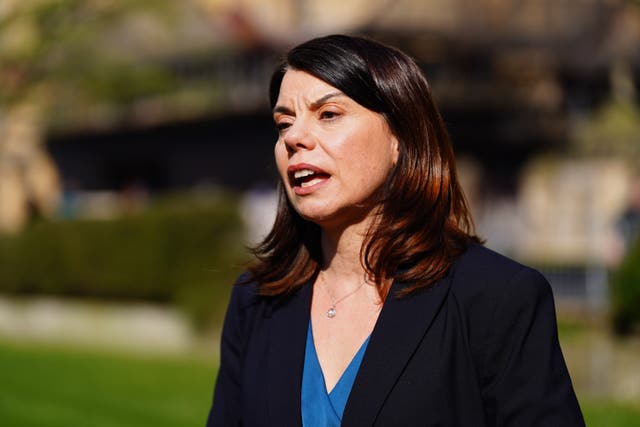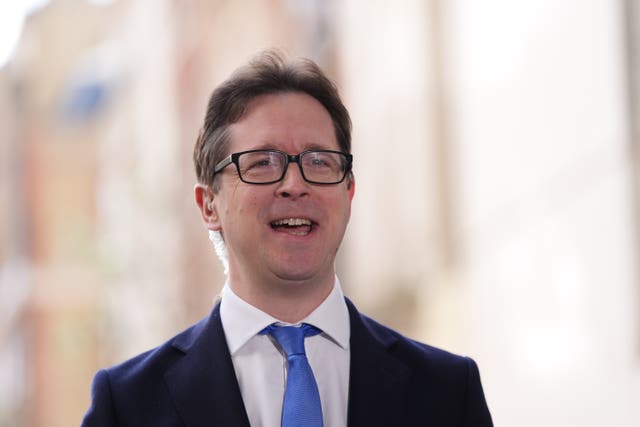Youth mobility scheme with EU ‘not in Government plans’, minister says
Nick Thomas-Symonds told MPs the Government is pursuing a new partnership with the EU which will make the UK ‘safer, more secure and more prosperous’.

A youth mobility scheme with the European Union is not in the Government’s plans, a Cabinet Office minister has said.
This comes after more than 60 Labour backbenchers signed a letter calling for “a new and bespoke youth visa scheme” for UK and European citizens under 30.
Speaking in the Commons, Nick Thomas-Symonds told MPs the Government is pursuing a new partnership with the EU which will make the UK “safer, more secure and more prosperous”.
The EU has pushed for a youth mobility scheme ahead of a UK-EU summit planned for May 19, with Prime Minister Sir Keir Starmer also meeting European Commission president Ursula von der Leyen on Thursday.
Pressing the Government on the issue of a youth visas scheme, Liberal Democrat Cabinet Office spokesperson Sarah Olney said: “Warm words about a reset in UK-EU relations is no longer enough. The summit taking place in London on the 19th of May is an opportunity for real action.
“So can the minister take this opportunity… that the summit presents to commit to bringing in a UK-EU youth mobility scheme that will boost economic growth and enhance chances for young people in our country and across the EU?”
Mr Thomas-Symonds replied: “On the issue of a youth mobility scheme, it is not part of our plans. We have always said we listen to sensible EU proposals, but we will not go back to freedom of movement.
“Where I do agree with her, is about concrete proposals and concrete progress on the 19th of May, and we are looking to secure that new partnership with the EU that will make our country safer, more secure and more prosperous.”

In their letter, the MPs and peers said any youth mobility scheme should be in line with the UK’s existing arrangements with countries such as Australia and Canada, with a time limit on visas and a cap on numbers.
The group also called for deeper collaboration with the EU on defence, a deal on sanitary and phytosanitary (SPS) measures to reduce border checks on food products, both of which are in line with Government policy, among other suggestions.
Later in the session, shadow Cabinet Office minister Alex Burghart urged the Government to “rule out dropping the right to annual quota negotiations on fishing”.
Mr Thomas-Symonds said he would not give “a running commentary on negotiations”, but added: “We will, of course, negotiate in the interests of our fishers.”
Mr Burghart then asked: “Can he assure the house that EU AI (artificial intelligence) rules will not be applied to Northern Ireland?”
Mr Thomas-Symonds said: “He again comes with his questions on the reset, and what I want to just say is we’ve had an atmosphere of collegiality, and I want to join in that atmosphere, because I want to agree with something that the leader of the Opposition said, when she said that the previous Conservative government left the EU without any plan for growth, and that is absolutely true.”
He added that “major retailers like M&S, Sainsbury’s, Morrisons, Lidl all supporting this Government’s approach in the reset to get an SPS (sanitary and phytosanitary) agreement, he should be backing that”.
Downing Street said it would not get into a “running commentary” about whether negotiations with the EU could include a youth mobility scheme in future.
The Prime Minister’s official spokesman told reporters: “Discussions with the European Union are ongoing at the moment.
“We’ve got clear manifesto commitments, we’ve got clear red lines in these talks, but with those discussions ongoing, I am just not going to get into commentary on any specific details.”
Former top civil servant Philip Rycroft, who served as permanent secretary at the Department for Exiting the European Union, has meanwhile warned that ministers made a “tactical mistake” by ruling out a mobility scheme.
“It meant that if we do a deal, and I hope we do on youth mobility, there will be accusations of a climbdown,” he said at an evidence session of the UK Trade and Business Commission on Thursday.

Elsewhere in Cabinet Office questions, Labour MP Matthew Patrick warned that “despite a record number of civil servants in a generation”, his constituents have faced “worse” outcomes.
The MP for Wirral West said: “It’s clear to me that under the last government, our state failed the public. We had an agenda not rooted in the lives of everyday people, which meant that despite a record number of civil servants in a generation, outcomes for my constituents in Wirral West and across the country were worse.
“So could (Pat McFadden) please set out how a smaller, more modern and more focused state can once again deliver world-class public services?”
Cabinet Office minister Mr McFadden replied: “Over recent years, the public has seen the state get bigger. It’s seen taxes go up, but they haven’t always felt that they’re getting the right outcome for those changes, and so to deliver our Plan for Change, we do need to reform the state to make it more efficient and more effective.
“We’ve started to deliver these reforms – stronger performance management, accelerating AI adoption, focus on the front line, reforming rules around recruitment and secondments.
“These plans will help empower our excellent Civil Services to work better to reduce bureaucracy and to focus on what really matters, which is better outcomes for the public.”





